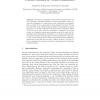Free Online Productivity Tools
i2Speak
i2Symbol
i2OCR
iTex2Img
iWeb2Print
iWeb2Shot
i2Type
iPdf2Split
iPdf2Merge
i2Bopomofo
i2Arabic
i2Style
i2Image
i2PDF
iLatex2Rtf
Sci2ools
103
click to vote
AP2PC
2005
Springer
2005
Springer
Optimizing an Incentives' Mechanism for Truthful Feedback in Virtual Communities
We analyze a mechanism that provides strong incentives for the submission of truthful feedback in virtual communities where services are exchanged on a peer-to-peer basis. Lying peers are punished with a severity that is exponential to their frequency of lying. We had first introduced and evaluated experimentally the mechanism in [1]. In this paper, we develop a Markov-chain model of the mechanism. Based on this, we prove that, when the mechanism is employed, the system evolves to a beneficial steady-state operation even in the case of a dynamically renewed population. Furthermore, we develop a procedure for the efficient selection of the parameters of the mechanism for any peerto-peer system; this procedure is based on ergodic arguments. Simulation experiments reveal that the procedure is indeed accurate, as well as effective regarding the incentives provided to participants for submitting truthful feedback.
AP2PC 2005 | Applied Computing | Beneficial Steady-state Operation | Strong Incentives | Truthful Feedback |
| Added | 26 Jun 2010 |
| Updated | 26 Jun 2010 |
| Type | Conference |
| Year | 2005 |
| Where | AP2PC |
| Authors | Thanasis G. Papaioannou, George D. Stamoulis |
Comments (0)

